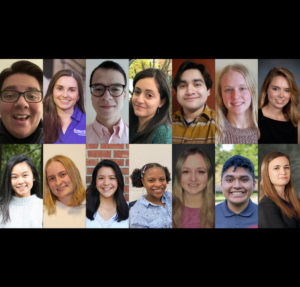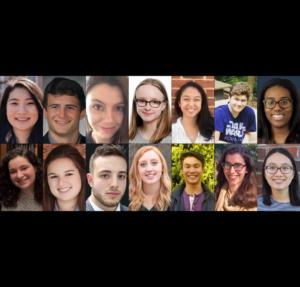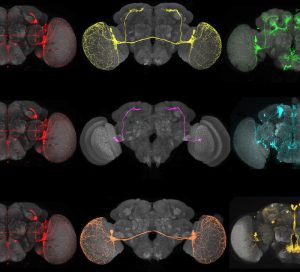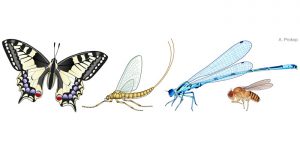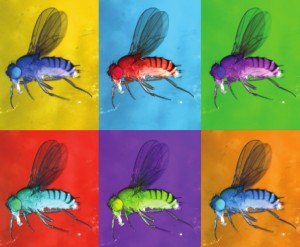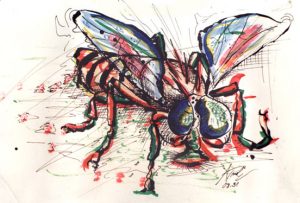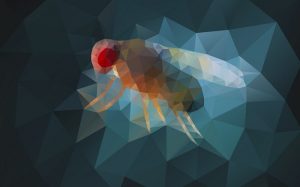Enter your address to receive notifications about new posts to your email.
Articles tagged Drosophila
(138 results)
-
News
Congratulations, 2020 Victoria Finnerty Travel Award recipients!
The Victoria Finnerty Travel Award supports travel costs for undergraduate GSA members who are engaged in research to attend the Annual Drosophila Research Conference, which was to be part of TAGC in 2020. Due to TAGC moving to an online format, 2020 awardees will instead present their work virtually at TAGC Online. Victoria Finnerty, who…
-
News
Congratulations to the 2019 Victoria Finnerty Travel Award recipients!
The Victoria Finnerty Travel Award supports travel costs for undergraduates engaged in research to attend the Annual Drosophila Research Conference. Victoria Finnerty, who died in February 2011, was a long-time member of the Genetics Society of America and served the Drosophila community and the genetics community at large in many capacities. A wonderful geneticist, Vickie’s ground-breaking…
-
Tools and technology FOMO? Don’t miss this session at #Dros19!
The Annual Drosophila Research Conference is the premier place to share your research with the fruit fly community and discover cutting-edge advances. Presentations cover the full diversity of Drosophila investigations, from genetics to molecular biology, cell biology, development, immunology, physiology, neuroscience, evolution, and more. Now in its 60th year, the Drosophila conference is meeting in…
-
How the fat body regulates fly sleep
The gene Ade2 links metabolism and sleep in the fat bodies of Drosophila. All animals need to eat and sleep. In fact, these critical behaviors are intertwined: animals adjust their sleep needs based on food availability and energy storage. In a Featured article in G3, Yurgel et al. delved into the molecular mechanisms that connect…
-
Why fruit flies belong in primary and secondary schools
Guest authors Sanjai Patel and Andreas Prokop explain why school biology lessons are important places to advocate fundamental biomedical research, and they present strategies developed by the Manchester Fly Facility to bring Drosophila research into primary and secondary classrooms. The need for fundamental biology research has perhaps never been greater than today, yet the conditions…
-
Time flies: Get ready for #Dros19
Registration is now open for the 60th Annual Drosophila Research Conference! In the fall of 1958, a handful of colleagues met to talk “more or less endlessly” for two days, mainly about the fruit fly Drosophila. Most of the dozen or so participants were members of James F. Crow’s laboratory at the University of Wisconsin–Madison.…
-
Why funding fruit fly research is important for the biomedical sciences
Guest post by Andreas Prokop. This blog post was originally published as an article in Open Access Government (Prokop, 2018b) to advocate for the importance of Drosophila research. It follows up on a previous piece in the same journal advocating for developmental biology (Prokop, 2018a). These articles aim to showcase how policy and decision makers…
-
The Sleep Inbred Panel: flies with extreme sleep patterns
A new collection of inbred flies provides a tool for studying genetic control of sleep. Sleep is vital for a healthy life, but some of us seem to get by with less snoozing than others. This individual variation isn’t unique to humans; fruit flies also show a variety of sleep patterns. These differences could potentially…
-
Nanopore sequencing of 15 Drosophila genomes
Low-cost sequencing closes gaps in fly genomes. Genetic sequencing technologies have revolutionized biological science, and regular advances in these tools continue to deliver better genomic data—more accurate and more useful—at a lower cost. In G3: Genes|Genomes|Genetics, Miller et al. report the genomes of 15 Drosophila species sequenced using Oxford Nanopore technology. Their work improves on…
-
The hole truth about activating Torso
Holes in the plasma membrane trigger the activation of the Torso receptor tyrosine kinase. As a general rule, cells don’t do well when holes are poked in their plasma membranes. That’s why many immune cells use enzymes like perforin to puncture the membranes of pathogenic cells, dysregulating and often killing them. However, a new report…
-
Drosophila development in the drink
A fruit fly model of fetal alcohol spectrum disorder reveals a Cyclin E-centric network modifies developmental sensitivity. Alcohol exposure in utero can lead to a wide range of developmental problems, even causing fetal death in some cases. But since this exposure doesn’t always have the same outcome, is it more likely to be a problem…

